How to Clean Paint Brushes After Oil Based Primer
Are painting primers necessary? What is the best paint primer? Should I choose water based latex primer, or oil based primer, or shellac based paint primer? Oh my!
We had the same questions through our successes and failures trying to paint all kinds of surfaces for our DIY projects, such as wood, drywall, metal, plastic, laminate furniture, IKEA kitchen cabinets, and more.
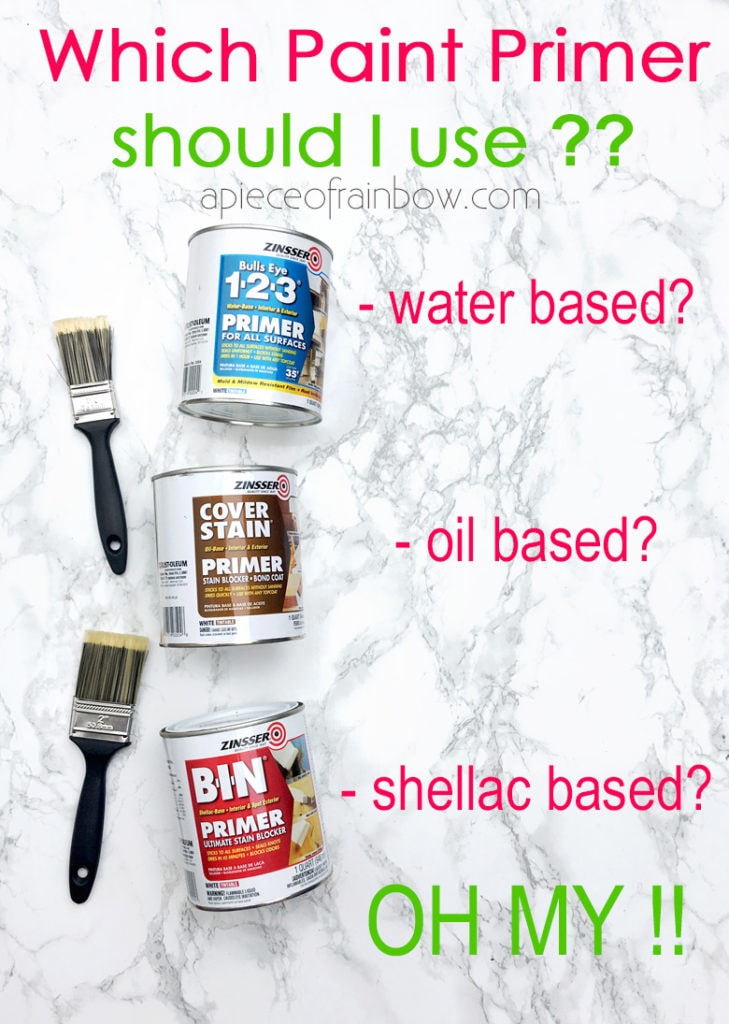
Finally we decided to test 3 popular painting primers side by side. We will share our test results and compare the pros and cons of each paint primer based on adhesion, durability, limitations, and ease of clean up.
* Some resources in article are affiliate links. Full disclosure here .
( Some of the helpful resources are affiliate links. Full disclosure here. )
Is paint primer necessary before painting?
First let's look at a great example of the importance of the right paint primer: when high gloss oil based paint on a door got painted over with water based latex paint, without priming!
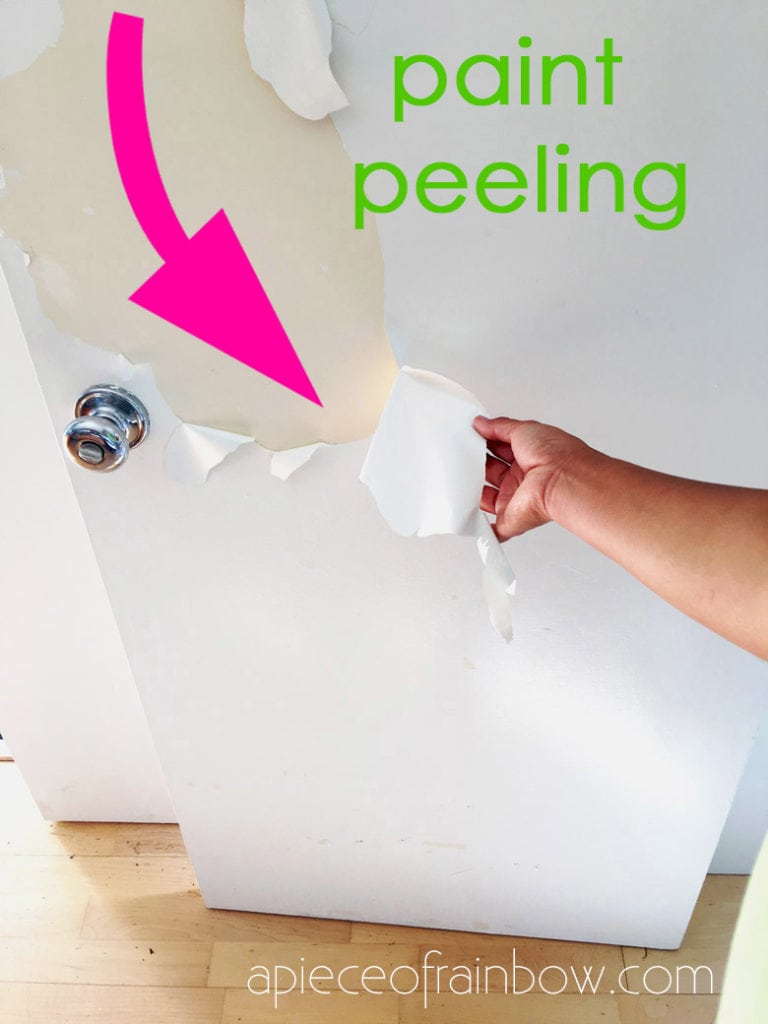
" Priming ensures better adhesion of paint to the surface, increases paint durability, and provides additional protection for the material being painted." ( wikipedia )
Paint primer is necessary when painting stained, smelly, or hard to adhere surfaces like smoke damage and odors, cedar wood bleed, metal, plastic, or laminate furniture. Primer also helps to save paint when painting porous surfaces like drywall or raw wood.
Some surfaces do not require a primer such as previously painted or finished easy-to-adhere surfaces.
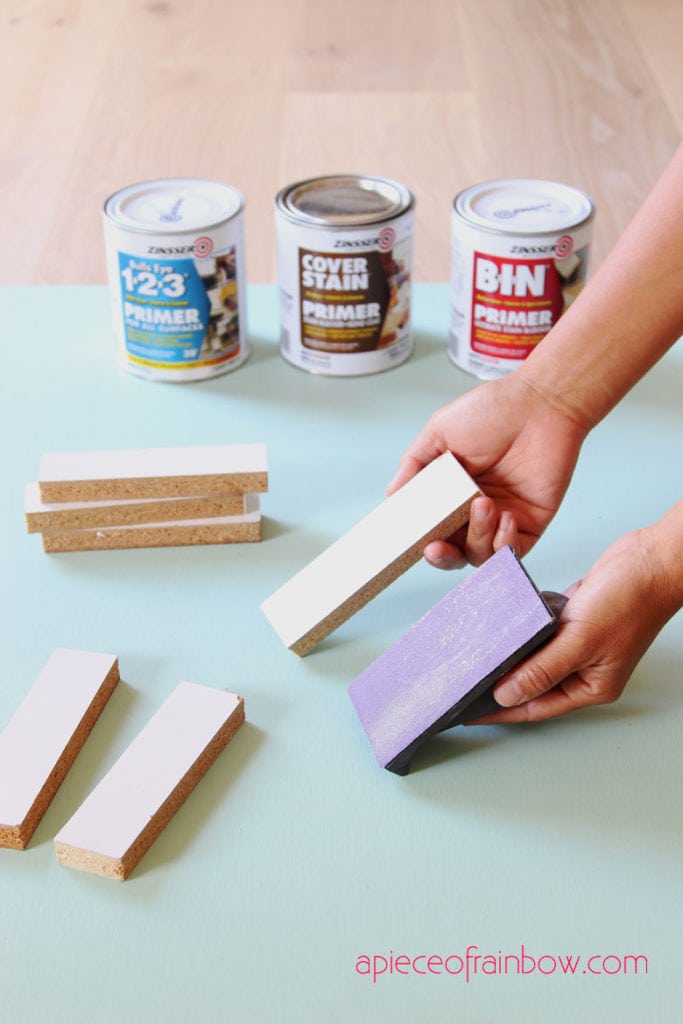
Our paint primer tests:
We cut 5 pieces from a glossy laminate mdf shelf, and did the following:
- no primer, no sanding
- sanded quickly with 200 grit sand paper, no primer
- sanded as #2, one coat of Zinsser 123 water based primer
- sanded as #2, one coat of Zinsser Cover Stain oil based primer.
- sanded as #2, one coat of Zinsser BIN shellac based primer.
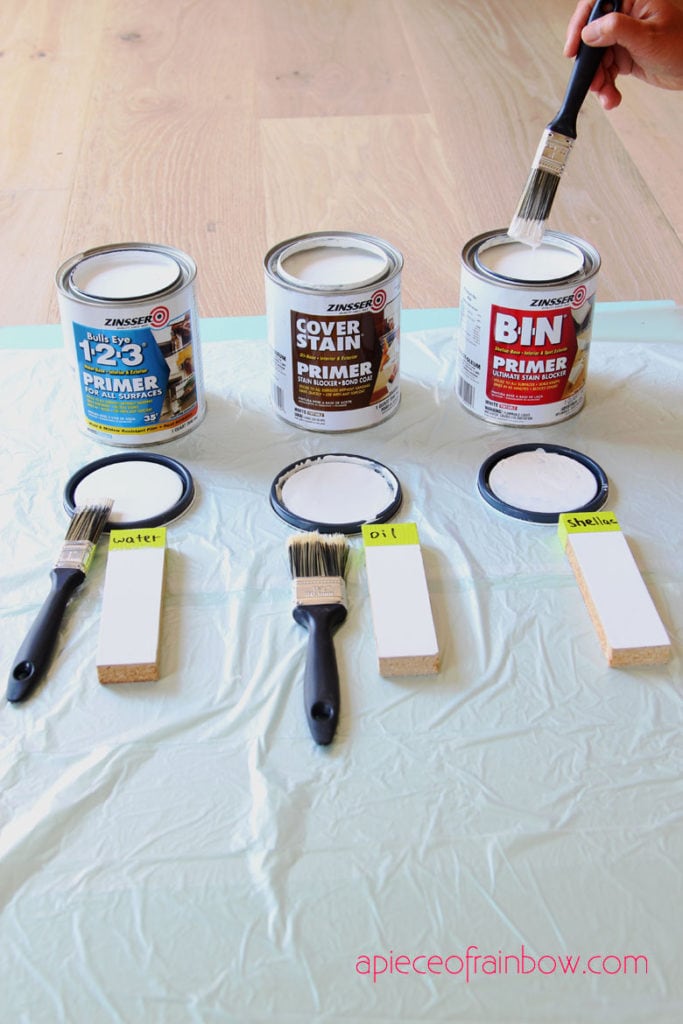
After the painting primers dried, we painted all the pieces using latex paint. We waited for the paint to dry and cure for 2 weeks, then tried to scratch the paint off, using medium pressure, then heavy pressure.
Here's what we found:
When we used no primer and no sanding, the paint came right off the glossy laminate with just light scratching.
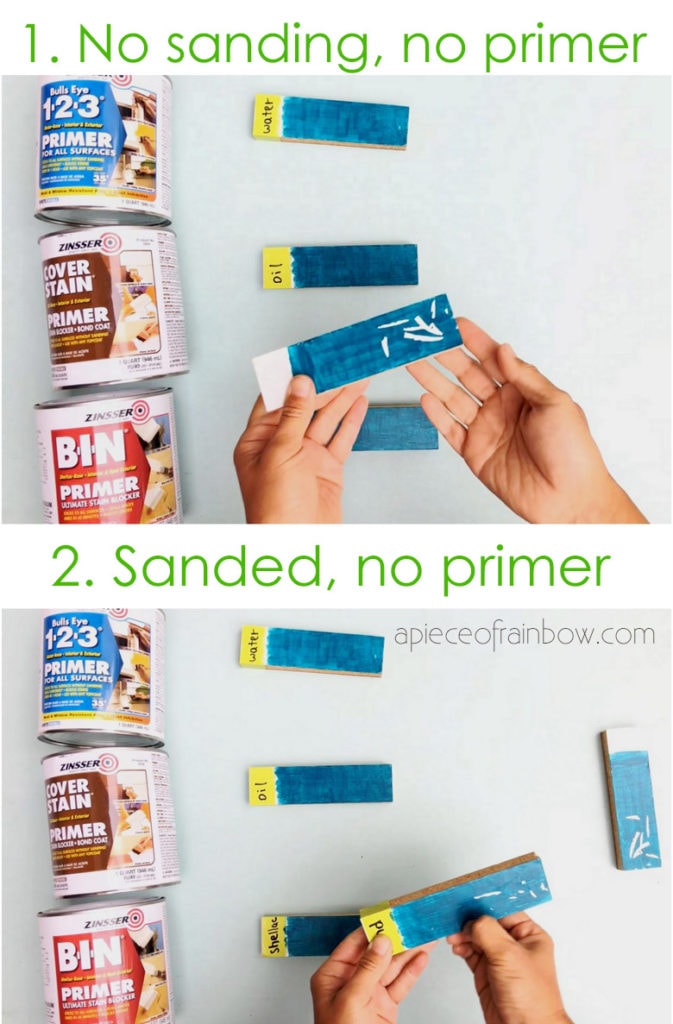
The piece that was sanded and without primer performed better. However, paint still came off with medium pressure scratching.
The rest of the test pieces are all sanded quickly with 200 grit sand paper, and painted with 3 different primers. Zinsser 123 water based primer, Zinsser Cover Stain oil based primer, and Zinsser BIN shellac based primer. They all held up MUCH better than the first two in the scratch tests.
Comparison of water based vs shellac vs oil based paint primer
We decided to use the same brand for clear comparisons. You can find other great brands such as Sherwin Williams, or international brands that also make these three types of primers.
Water based primer ( aka Latex Paint Primer )
We used Zinsser 123 water based primer. Dry time: one hour. Best temperature for application: between 35f and 90f ( 2c and 32c)
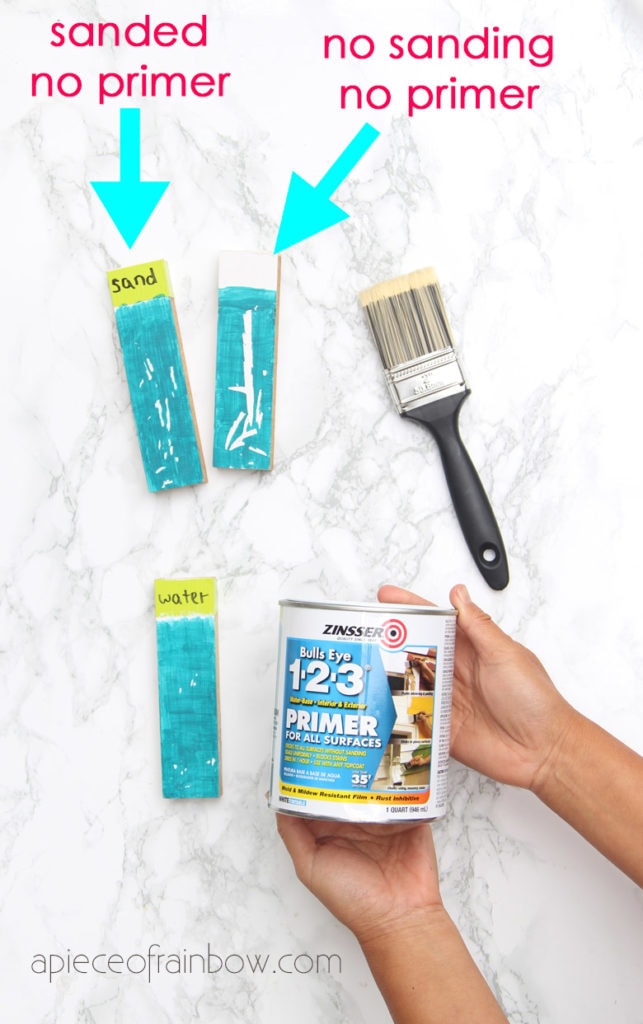
Adhesion and Durability
It held up well in our scratch test. Only little bits of paint came off when we used heavy pressure.
Pros
Very good adhesion. Low odor, super easy to use and clean up with water. Good for indoors and outdoors.
Because of the ease of use, we try to use water based paint primer as much as possible for our DIY projects, like how we gave this dated old fridge a $2000 new look, for less than $20!
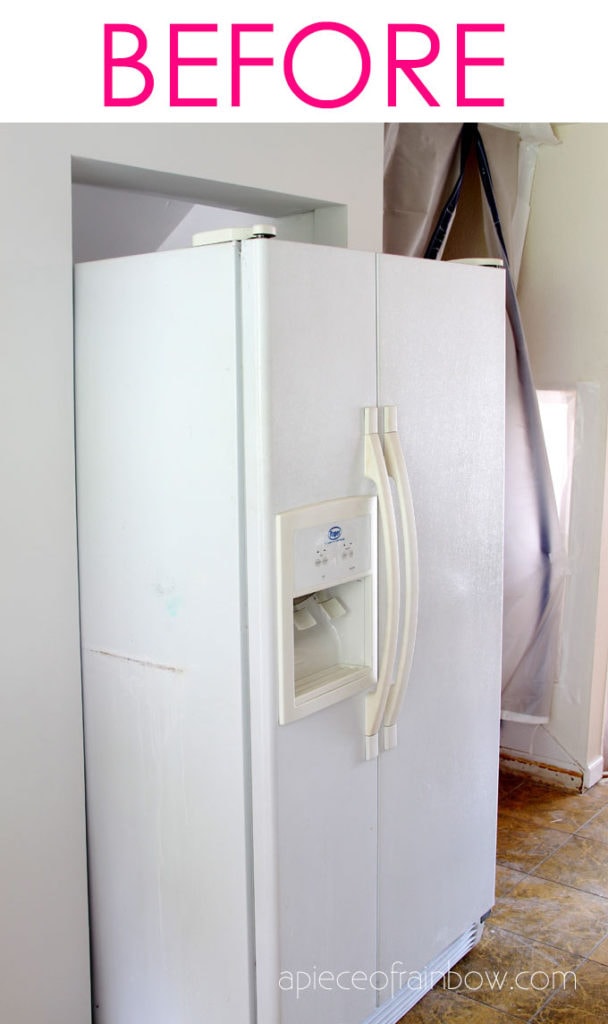
Cons:
Not recommended for raw wood and unfinished MDF, because water content can cause swelling. For really glossy surfaces like laminate IKEA cabinets, the adhesion is not as strong as shellac primer.
Oil based primer
We used Zinsser Cover Stain oil based primer. Dry time: one hour. Best temperature for application: between 40f and 90f (4c and 32c)
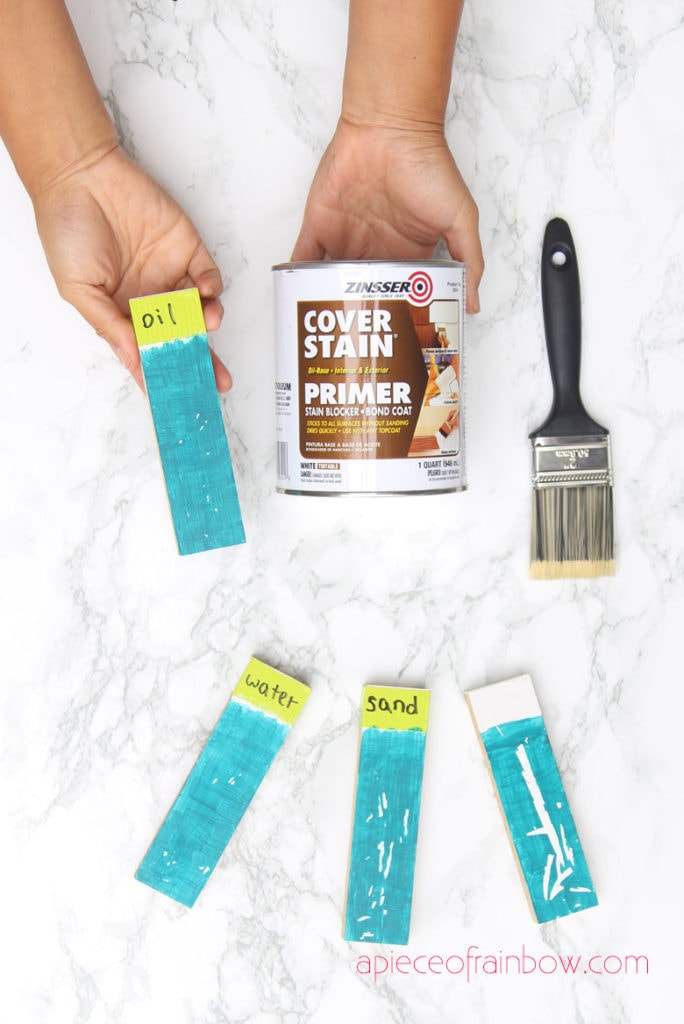
Adhesion and Durability
This oil based primer offers even better adhesion than the water based primer in our scratch test. Only little bits of paint came off when we used heavy pressure.
Pros
Good for interior and exterior projects, block stains and odor, hide dark colors, prevent tannin bleed, and seal exterior wood..
Cons:
Use in well ventilated space due to its odor. It's also thicker than the other two primers, and brush marks are more visible, so you may want to sand the piece after priming and before painting . Clean up is more complicated, need to use mineral spirits.
Shellac primer
We used Zinsser BIN shellac based primer. Dry time: super fast in 45 minutes. Wide range temperature for application: between 0f and 90f (-18c and 32c).
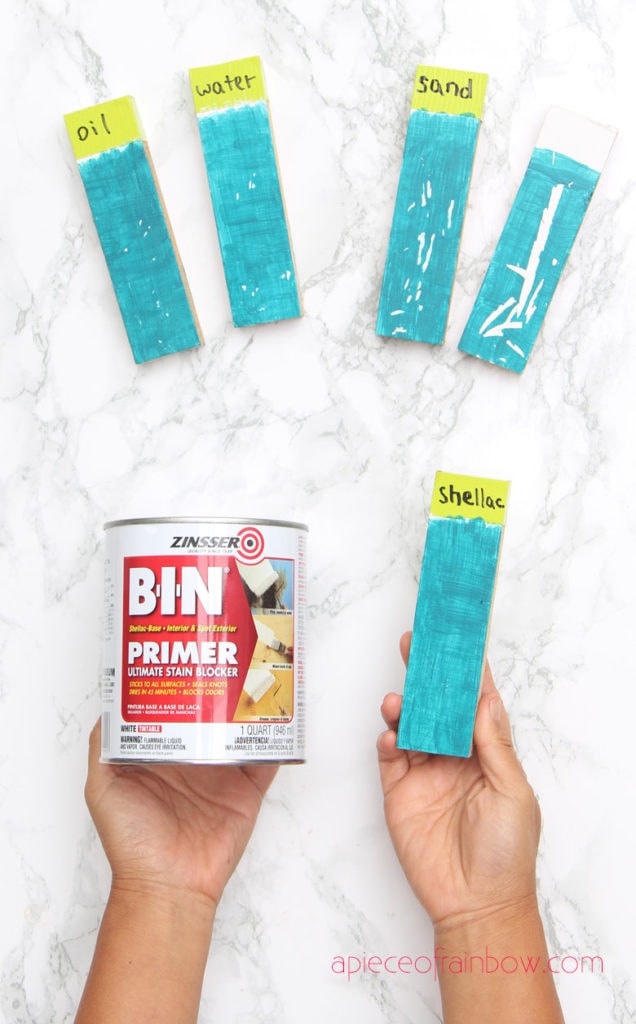
Adhesion and Durability
It held up the best in our scratch test. No paint came off even when we used heavy pressure.
Pros
Truly a great primer for tough to adhere surfaces. Hardens to a very durable surface. You can skip sanding on most surfaces. Permanently blocking stains and odors. It's very thin and easy to apply.
Cons:
The strongest smelling of all 3! Use in well ventilated space. Wear gloves because it is super sticky and hard to clean! Not recommended for full surface exterior applications or very humid interiors, only spots.
Do NOT use shellac primer in a paint sprayer! Clean up is more complicated, need to use denatured alcohol or Acetone Nail Polish Remover, which also removes superglue, thus could ruin your paint brush! Ask how I found that out 😉
FAQ about paint primers
Can I used latex paint over shellac or oil based primer? Or oil based paint on latex or shellac primer?
Yes, you can use ALL 3 types of primers over or under latex and oil based paint. Some glossy surfaces will benefit from sanding first.
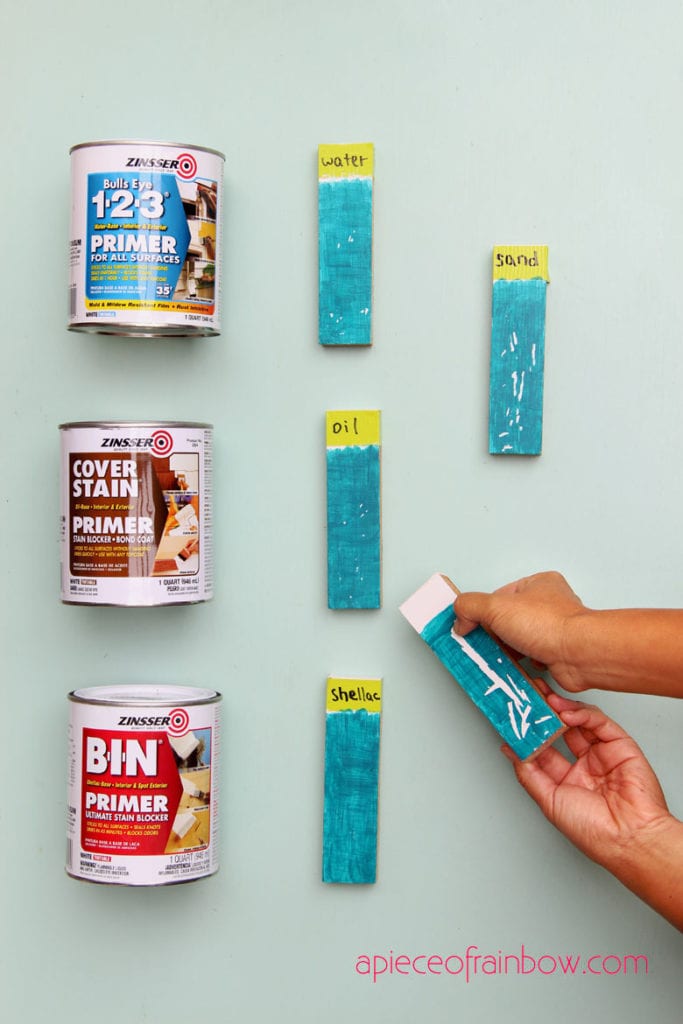
Is sanding necessary before priming?
Only on hard to adhere surfaces like plastic, laminate, oil painted, high gloss finishes, etc. However, it is important to clean the surface thoroughly so there is no dirt and grease before priming! Dr Bronner's Sal Suds is our go to cleaner, you can dilute it a lot, it's all natural and smells amazing!
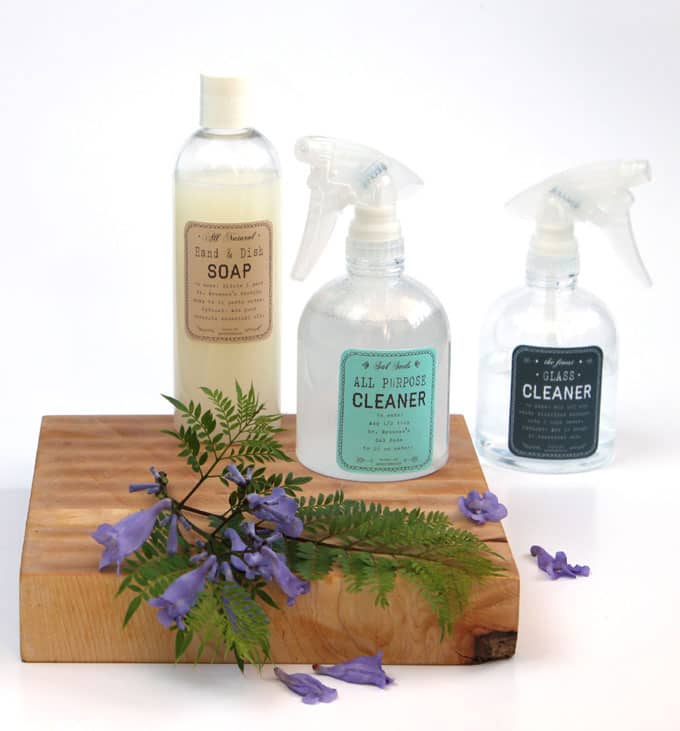
Check out our easy and super effective DIY green cleaning recipes with free labels!
Can I used primer as paint? What is the difference between paint and primer?
It is best not to skip the paint, because primers and paints have different functions.
Paint needs a relatively "rough" surface to be able to adhere well, primer provides the "rough" surface while sealing the surface to be painted.
Primer is dull so it can get dirty easily, and it is harder to wipe clean, so it is best to add at least a coat of paint over it.
This is why satin or semi-gloss paint is often used in bathroom and kitchen where mold might grow or wiping the walls regularly is needed.
Summary of our paint primer test:
The shellac based primer is the most durable and provides the best adhesion. However, it is not recommended for exterior use, and clean up is more challenging.
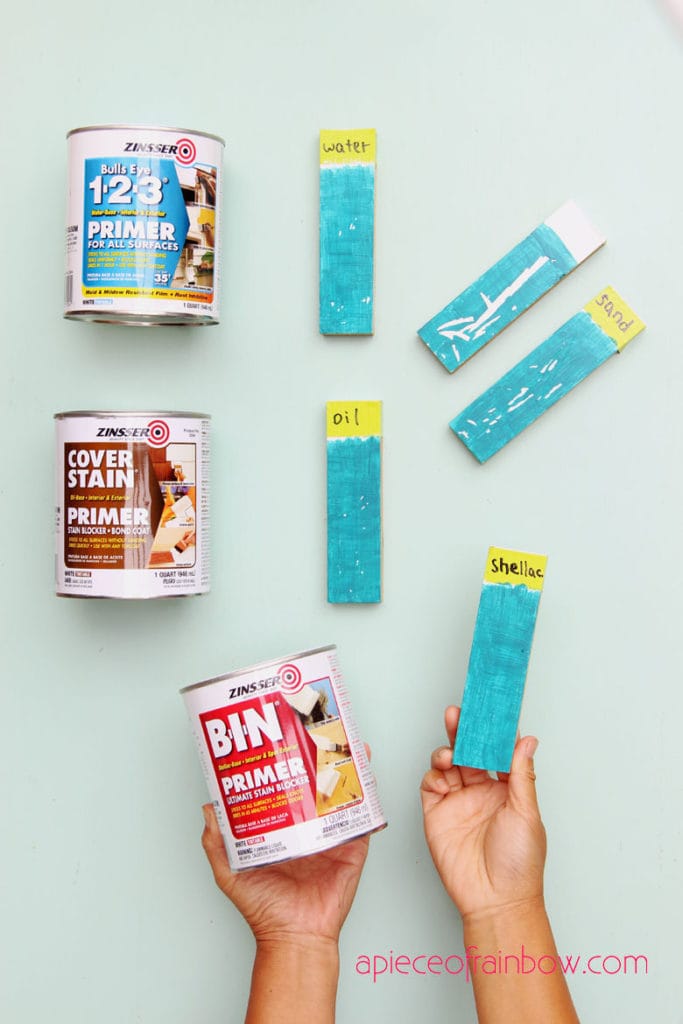
Water based primer is the most pleasant to use and the easiest to clean up. It is low odor, great for surfaces that are easier to adhere. For glossy surfaces, sanding is very important .
Oil based primer is great for raw wood and mdf, where water based primer may cause swelling or stain to bleed through. The durability and easy of clean up is between water based and shellac based painting primers.
Based on these tests, we are using water based primer on our IKEA hack vanity cabinet, and shellac based primer on our IKEA kitchen island. Stay tuned for tutorials! They are both high gloss enamel surfaces. But the powder room vanity does not have to endure high traffic and frequent use like the kitchen island, so a water based primer will be durable enough with proper sanding.
More painting ideas & inspirations:
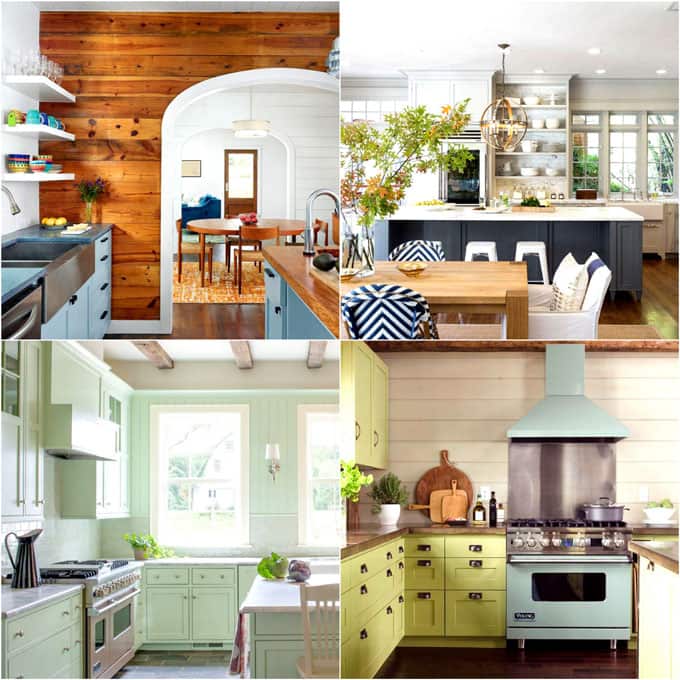
Hope our tests make it easier for you to choose the best paint primer for your project. Feel free to share your experiences in the comments!
How to Clean Paint Brushes After Oil Based Primer
Source: https://www.apieceofrainbow.com/choose-paint-primer-latex-shellac-oil/
0 Response to "How to Clean Paint Brushes After Oil Based Primer"
Post a Comment